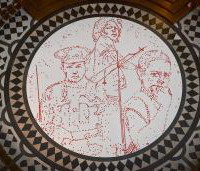St Pauls poppy installation remembers child soldiers
An installation of poppies in St Paul’s Cathedral marks the continued involvement of children in war, despite its practice being declared illegal by the UN.
Over 5,000 poppies will be scattered under the dome of St Paul’s in an art installation on Remembrance Day, Friday 11th November 2011. From ground level the poppies appear to have fallen randomly, but when viewed from the Whispering Gallery the poppies form an image of three child soldiers; one from the First World War and two from more recent conflicts.
The 30 foot wide installation created by artist Ted Harrison highlights the involvement of children in war. Although declared illegal by the UN some 250,000 under-age children are currently active combatants – most having been forced or coerced into volunteering. Thousands are killed, wounded or traumatised every year.… Read more

